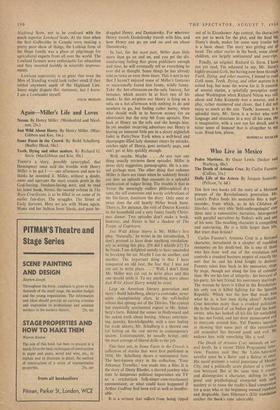Again—Miller's Life and Loves
Some Faces in the Crowd. By Budd Schulberg. (Bodley Head, 16s.) Teeth, Dying and other matters. By Richard G. Stern. (MacGibbon and Kee, 30s.) THERE'S a story, possibly apocryphal, that Hemingway once said the trouble with Henry Miller is he got f— one afternoon and now he thinks he invented it. Miller, without a doubt, owns and operates the most cosmic penis in the God-fearing, freedom-loving west, and to read his latest book, Nexus, the second volume in The Rosy Crucifixion, is to be filled in on some of its earlier fun-days. The struggles. The Street of Early Sorrows. Here we are with Mona again, Mona and her lesbian lover Stasia, and poor be- draggled Henry, and Dostoievsky. For wherever Henry travels Dostoievsky travels with him, and how Henry can go on and on and on about Dostoievsky.
In fact, for the most part, Miller does little more than go on and on, and you get the dis- comforting feeling that given publishers enough and time, he will eventually tell us everything he ever did or thought. Some things he has already told us twice or even three times. This is not to say that I haven't enjoyed some of Miller's fantasies or occasionally found him funny, wildly funny. Take the hot-afternoon-on-the-sofa fantasy, for instance, which occurs in at least two of his books. In this set-piece our Henry is lying on a sofa on a hot afternoon with nothing to do and nowhere to go, but feeling rather horny, when who should walk in to borrow money for an abortionist but the sexy bit from upstairs. One look at Henry on the sofa and she humps him. In yet another recurring adventure our Henry is having an innocent little pee in a sleazy nightclub toilet in Paris/ New York when a well-bred and champagne-filled lady slummer enters by mistake, catches sight of Henry, goes instantly gaga, and can't get at him quickly enough.
Well, maybe. Maybe. . . . At any rate one thing usually retrieves these episodes. Miller is never slyly suggestive, pornographic. He is a sex- ual garbage man. The other thing that redeems Miller is there are times when he suddenly breaks out into an episode that amounts to a splendid celebration of vulgar living. The trouble is that in Nexus the seemingly endless philosophical dry runs, the self-conscious and wordy celebrations of the life-force, dominate the diary. Only once or twice does the old bawdy Miller break loose. There is, for instance, the visit of Doctor Kronski to the household and a very funny family Christ- mas dinner. Two episodes don't make a book, however, and Nexus is but a shadow of The Tropic of Capricorn.
Just Wild About Harry is Mr. Miller's first play. 'Naturally,' he writes in the introduction, 'I don't pretend to have done anything revolution- ary in writing this play. (Or did I whistle it?) To be frank, I am delighted merely to have succeeded in breaking the ice. Maybe I can do another, and another. The important thing 'is that I have conquered an old fear, the fear that I was not cut out to write plays. . . Well, I don't think Mr. Miller was cut out to write plays and this one should settle it. To say anything more about Just Wild About Harry would be cruel.
Leap an American literary generation and there's Budd Schulberg, always a contender, never quite championship class, in the soft-boiled school that sprung out of the Thirties. The cynical but essentially sentimental exposé is Mr. Schul- berg's forte. Behind the scenes in Hollywood and the naked truth about boxing. Always entertain- ing, punchy, knowledgeable, with a nice feeling for trade idioms, Mr. Schulberg is a shrewd one for hitting on the raw nerves in contemporary society. Unfortunately, he usually brings only the most average of liberal drills to the job.
This time out, in Some Faces in the Crowd, a collection of stories that were first published in 1954, Mr. Schulberg shows a sentimental face. The best-known story in the collection, 'Your Arkansas Traveller,' was made into a film. It is the story of Dusty Rhodes, a shrewd cowboy who rises to dangerous political importance via TV as a crackerjack folk-singer-cum-reactionary commentator, or what could have happened if Arthur Godfrey had been evil as well as insuffer- able.
It is a sermon that suffers from being ripped
out of its Eisenhower Age context, the characters are put to work for the plot, and the final bit, Dusty's death, makes for some easy ironies but is a basic cheat. The story was getting out Of hand. The other stories in the book, some about children, are largely sentimental and over-ripe.
Finally, an original. Richard G. Stern. I have not yet read, I'm ashamed to say, Mr. Stern's highly-praised Golk, but having now been through Teeth, Dying, and other matters, I intend to read Golk soon. Teeth, Dying, and other matters is a mixed bag, but none the worse for it. It consists of several stories, a spitefully perceptive essay about Washington when Richard Nixon was still about and John Kennedy was a senator, and a play, rather mannered and clever, that I did not enjoy as much as the rest. 'Teeth,' however, is a splendid story. Mr. Stern is a writer who uses language and situations in a way all his own. He is imaginative, with a rare eye for detail, and a bitter sense of humour that is altogether to mY taste. Read him, please.
MORDECA I RICHLER






























 Previous page
Previous page